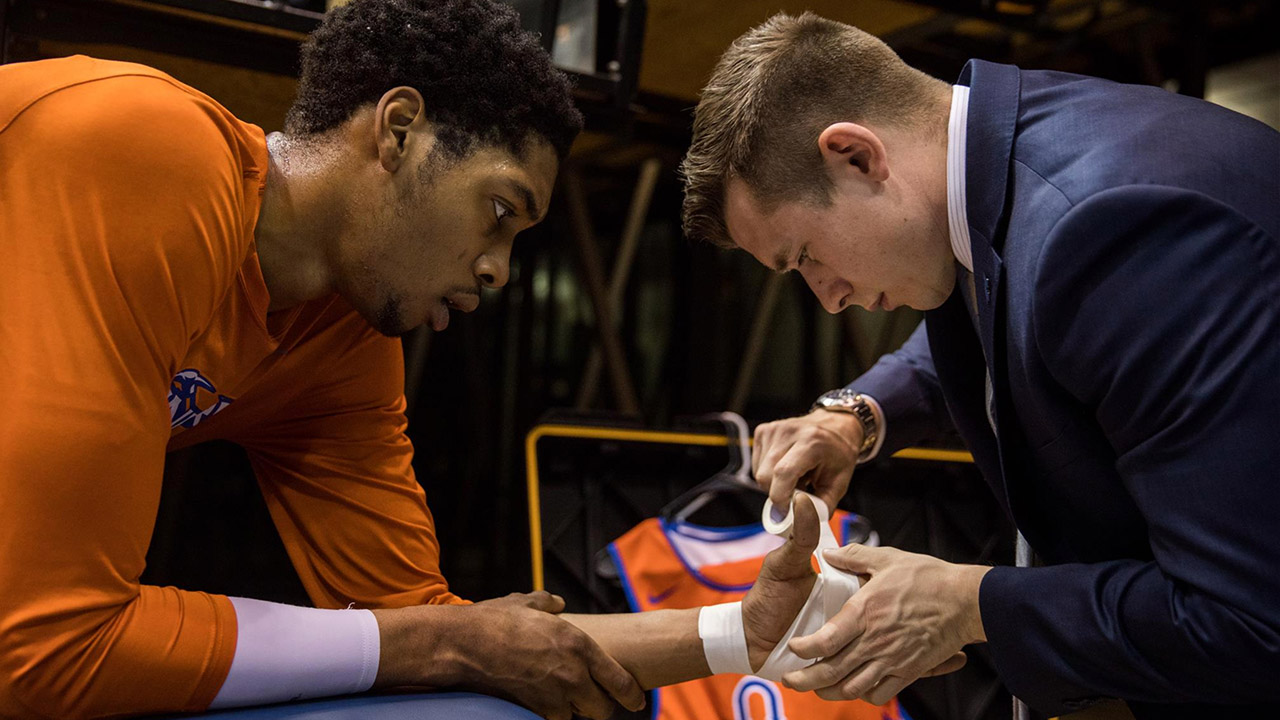
Michael Martin is in his sixth season at the University of Wisconsin-Platteville. Martin started as an assistant athletic trainer and strength and conditioning coach. He maintains his role as an assistant athletic trainer but is now the coordinator for strength and conditioning of Olympic sports. Martin graduated from Loras College in 2014 with a Bachelor of Science in Athletic Training and earned a Master of Science in Kinesiology at UW-Madison in 2016. As a graduate student, Martin worked with the University of Wisconsin-Madison's strength and conditioning program, working mainly with the football team. Over the summer, Martin and Head Football Strength and Conditioning Coach Jason Wagner developed the Pioneer Performance Center to maximize space for student-athletes and health and human performance students to work out. As an athletic trainer, Martin mainly works with women’s volleyball, men’s basketball and the track programs. Martin is originally from Madison, Wisconsin.
Why did you choose a career path in athletic training and strength and conditioning?
It’s something that has always interested me since high school. I wasn’t the most physically gifted athlete, so the idea that a combination of proper strength and conditioning along with strategic preventative rehab can elevate an athlete’s game has intrigued me. I honestly wasn’t 100% sold on it until half-way through my senior year of high school, when I finally decided on majoring in athletic training with a minor in coaching instead of studying political science. I’m actually the only one in my family who doesn’t hold a political science degree or history degree.
What is a typical day like for a Pioneer athletic trainer?
My typical day during the fall season typically starts at 4:15 a.m. and I’m in the office at 5:15 a.m. to prep for my 6 a.m. lift. I’ll typically have two or three groups come through the weight room depending on the day. Following the clean-up and paperwork organization from the morning lifts I get my own workout in. Once I get my sweat in, I have office hours where I get paperwork done, document injuries, plan the next phase of workouts and see patients. At 2 p.m. preparation for practice begins and at 2:30 p.m. pre-practice treatments start. I’ll typically have practice from 3:30 p.m. until 5:30 p.m. and then an hour’s worth of treatments. Follow post practice treatments I’ll finish up whatever paperwork needs to be done and leave around 7 p.m.
A 7 p.m. weekend game is much different and my favorite day of the week. My day usually starts at 7 a.m., when I prep my meals for the day and do morning check-ins. I’m in the office by 10:30 a.m. to start putting athletes through various rehabs and recovery techniques. At 11:30 a.m., the younger players on the team will get a gameday developmental lift in, while the high minutes players do balance and recovery work. Following the lift, I have more treatments and then get my own workout in. At 2:30 p.m. is the set-up for 3 p.m. walk through and at the conclusion of the walk through, my intern and I will finish setting-up the court for the game later that night. At 4:30 p.m, pre-game treatments begin. At 5:40 p.m., the team will go through a dynamic warm-up on the court and then do some post activation potentiation before their skill work begins. Once that is complete, the suit and tie come on and it’s back up on the floor for game time. During the game I provide medical coverage for not only the Pioneers, but the visiting team if they don’t travel with an athletic trainer. Following the game, I stretch the team and provide post treatments. Once post treatments are complete, the game day set up is torn down and put away. The last thing at the end of the night is a debrief with the coaching staff.
What advice would you give to a student that wants to pursue athletic training or strength and conditioning as a career?
My advice would be to spend some time talking to and shadowing a strength coach or athletic trainer to get an idea of what it is really like. Both are highly rewarding jobs but just like any profession there are some down sides, like the amount of paperwork, giving athletes disappointing news and the long hours. But if you can deal with those things, you can really make a positive impact in an athlete’s life.
How has the new stat-of-the-art athletic training room and new addition benefited the student-athletes at UW-Platteville?
The new state-of-the-art athletic training room has allowed us to treat a higher volume of athletes and have expanded the type and quality of care we can provide. We have the ability to provide the latest modalities and treatments that are on par with larger clinical practices.
What are some things or hobbies you like to do to get away from athletics and recharge your batteries?
I like to work out, cook, tend a vegetable garden, draw, listen to music or audiobooks or watch a show. I also enjoy spending time with friends and just relaxing outside taking it slow. Almost all of my day is spent inside at a frantic pace where everything is scheduled, so when I’m not in the office I like to slow down.